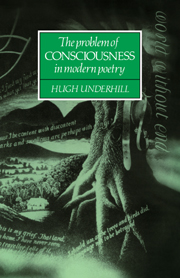Book contents
- Frontmatter
- Contents
- Preface
- Introduction: the inward revolution
- 1 From Georgian origins to ‘Romantic primitivism’: D. H. Lawrence and Robert Graves
- 2 Strangers to nature: modern nature poetry and the rural myth
- 3 The ‘poetical character’ of Edward Thomas
- 4 ‘Myself must I remake’: W. B. Yeats
- 5 ‘Here and now cease to matter’: T. S. Eliot
- 6 The work of Man: Louis MacNeice and W. H. Auden
- 7 ‘Nothing of our light’: Ted Hughes
- Conclusion
- Notes
- Select bibliography
- Index
6 - The work of Man: Louis MacNeice and W. H. Auden
Published online by Cambridge University Press: 18 December 2009
- Frontmatter
- Contents
- Preface
- Introduction: the inward revolution
- 1 From Georgian origins to ‘Romantic primitivism’: D. H. Lawrence and Robert Graves
- 2 Strangers to nature: modern nature poetry and the rural myth
- 3 The ‘poetical character’ of Edward Thomas
- 4 ‘Myself must I remake’: W. B. Yeats
- 5 ‘Here and now cease to matter’: T. S. Eliot
- 6 The work of Man: Louis MacNeice and W. H. Auden
- 7 ‘Nothing of our light’: Ted Hughes
- Conclusion
- Notes
- Select bibliography
- Index
Summary
The notion of the modern city as a fit subject for poetry was a long time taking a hold among poets writing in English, though the Americans were quicker at it than the British. In England, James Thompson's The City of Dreadful Night (1874) is an early but abortive attempt, and I have referred to others, but always that seductive rural myth lures the poet, making it hard for him to accept the city as a poetic habitat. Even Eliot's poetry, for all the urbanness of his sensibility, draws much on its force from being at odds with the modern urban experience. It is not till the thirties that certain young poets come to terms with it. In doing so, they tentatively point to possibilities for moderating the more extreme kinds of modern subjectivity, for writing a more ‘public’ poetry, founded in historical time and place. In the cases of Baudelaire and Eliot this had failed, because while they found in the streets, in Eliot's words, their ‘centre of intensity’, the city was for them, as G. M. Hyde, quoting Baudelaire, points out, the place where multitude is solitude (‘The Poetry of the City’, p. 337), still the theatre of a journey within.
- Type
- Chapter
- Information
- The Problem of Consciousness in Modern Poetry , pp. 215 - 268Publisher: Cambridge University PressPrint publication year: 1992



